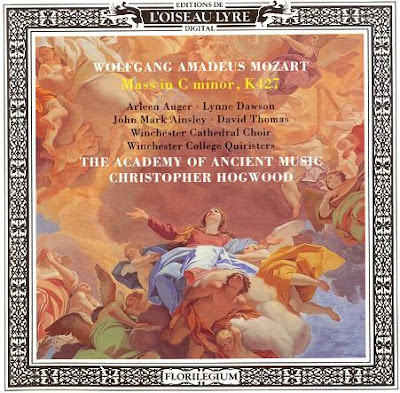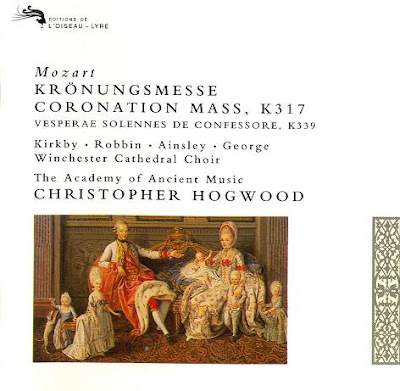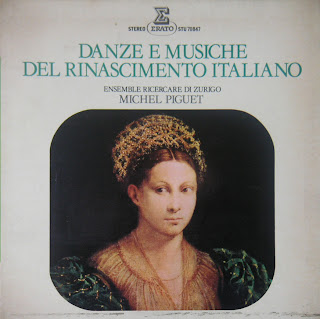 2 CD - MP3 192 Kbps - 2 RAR (190Mb)
2 CD - MP3 192 Kbps - 2 RAR (190Mb)
Uploaded
CD 1 - - CD 2
FileFactory
CD 1 - - CD 2
This is an opera seria, the same kind of opera composed by Handel a half-century earlier and many others in the century before him. It was already very old-fashioned when Mozart took it up (on a royal commission, an offer he couldn't refuse), finishing it only a few months before his death. The unlikely plot inspired some of the greatest music Mozart ever composed--music that breathed new life into the rickety opera seria form. Christopher Hogwood has assembled a superb array of specialists to perform with his period-instrument orchestra and do this underappreciated opera musical and stylistic justice.Joe McLellan
 23 tracks - MP3 192 Kbps - 2 RAR (107Mb)
23 tracks - MP3 192 Kbps - 2 RAR (107Mb)
Uploaded - FileFactory
Christopher Hogwood has previously released recordings of music by Bach and Handel on the clavichord. Each of these is called "The Secret ..." because it represents private and personal music making in one's home. This wonderful disk presents music by Mozart, which is particularly nice because we associate his music so much with the piano (though his piano was vastly different than the usual iron framed, long ringing piano we play on today).
 8 tracks - MP3 192 Kbps - RAR (87Mb)
8 tracks - MP3 192 Kbps - RAR (87Mb)
Uploaded - FileFactory
These two serenades used to be practically unknown fifty years ago, except to specialists and the public at the Salzburg Festival: now they are among Mozartian favourites.
 13 tracks - MP3 192 Kbps - RAR (69Mb)
13 tracks - MP3 192 Kbps - RAR (69Mb)
Uploaded - FileFactory
Hogwood chooses to use the Maunder edition which substitutes key sections with pieces from other Mozart compositions in an effort to keep the composition as purely Mozart as possible. In doing so, he may have achieved to some degree a more "pure" Mozart authorship, but on the other hand the piece has lost it's overall musical structure and proportion and in this respect it is clearly less "Mozartian".
 12 tracks - MP3 192 Kbps - RAR (77Mb)
12 tracks - MP3 192 Kbps - RAR (77Mb)
Uploaded - FileFactory
“Mozart left unfinished the work that ought to have been the choral masterpiece of his early Viennese years but there's enough of it to make up nearly an hour's music – music that's sometimes sombre, sometimes florid, sometimes jubilant. Hogwood avoids any charge of emotional detachment in his steady and powerful opening Kyrie, monumental in feeling, dark in tone; and he brings ample energy to the big, bustling choruses of the Gloria – and its long closing fugue is finely sustained. The clarity and ring of the boys' voices serve him well in these numbers. There's a strong solo team, headed by the late Arleen Auger in radiant, glowing voice and, as usual, singing with refined taste; Lynne Dawson joins her in the duets, John Mark Ainsley too in the trio. But this is essentially a 'soprano mass' – Mozart wrote it, after all, with the voice of his new wife (and perhaps thoughts of the much superior one of her sister Aloysia) in his mind – and Auger, her voice happily stealing in for the first time in the lovely 'Christe', excels in the florid and expressive music of the 'Et incarnatus' (where Richard Maunder has supplied fuller string parts than usual, perhaps fuller than Mozart would have done had he finished the work). Hogwood directs with his usual spirit and clarity.”

 13 tracks - MP3 192 Kbps - RAR (85Mb)
13 tracks - MP3 192 Kbps - RAR (85Mb)
Uploaded - FileFactory
Mozart's Horn Concertos, along with his earlier Symphonies and Violin Sonatas, Church Sonatas and the two Piano Quartets, are among his most underrated compositions, if not the most underrated.
 7 tracks - MP3 192 Kbps - RAR (70Mb)
7 tracks - MP3 192 Kbps - RAR (70Mb)
Uploaded - FileFactory
If you respond to Kirkby's elegant voice, which has the character almost of a boy soprano, you will love this album. This Exsultate Jubilate is a slight variant of the familiar staple. Oboes are replaced with flutes and the words are slightly altered, but these changes are minor. Kirkby's angelic soprano sails through the work with effortless skill and a beauty that will have you listening with rapt attention to every note. The three rarities included, the Ego interest and the two Reginas, are real gems, especially the charming Regina K. 108, which alone would be worth the price.
 11 tracks - MP3 192 Kbps - RAR (84Mb)
11 tracks - MP3 192 Kbps - RAR (84Mb)
Uploaded - FileFactory
 2 CD - MP3 192 Kbps - RAR (203Mb)
2 CD - MP3 192 Kbps - RAR (203Mb)
Uploaded
CD 1 - - CD 2
FileFactory
CD 1 - - CD 2
 13 tracks - MP3 192 Kbps - RAR (80Mb)
13 tracks - MP3 192 Kbps - RAR (80Mb)
Uploaded - FileFactory
Christopher Hogwood and company score again with a rousing yet reverant telling of two of Mozart's less frequently heard choral works. The Coronation Mass is a thrill; crisply sung with refreshingly clear intonation and toning. The solo quartet features uniformly strong singers who zip and soar with Mozartian ease. It's been quite a while since I've heard as strong a quartet as this. This production of the Mass alone would place Mozart on a pedestal!
The production of the Vesperae Solennes is also majestic and exuberant. The Laudate Dominum is clearly the strongest of the movements; the soprano solo literally floats above what must be heaven itself.
The latin is not the vulgare pronounciation usually heard in choral readings - but that quibbling can be left to scholars. The rest of us can just hook up and enjoy.
 6 tracks - MP3 192 Kbps - RAR (78Mb)
6 tracks - MP3 192 Kbps - RAR (78Mb)
Uploaded - FileFactory
This CD is a successful coming-together of two of Mozart's best concerti, two brilliant soloists and some very good conducting.
More often than not, the Oboe Concerto in C is heard in its flute version - transposed to the key of D. This recording presents Mozart's original layout of the oboe concerto played with period instruments or accurate replicas. The bold stability of the key of C major suits the optimism of this concerto, composed in what many call Mozart's mid-period. Fresh yet mature, the language is extremely expressive. The contrast between the three movements goes to the heart of 18th-Century theory on dramatic contrasts - with the confident Allegro, the lyric Adagio and the bouncy Allegretto.
The Clarinet Concerto brings the listener to another mood - that of Mozart's more somber "third period." Compared to the oboe concerto, the tones are darker, the melodic phrases longer and the counterpoint between the solo and the orchestral voices more complex and pronounced.
 8 tracks - MP3 192 Kbps - RAR (83Mb)
8 tracks - MP3 192 Kbps - RAR (83Mb)
Uploaded - FileFactory
This lovely collection, recorded in 1988 and '89, finds Emma Kirkby at her mature best. The voice is still silvery and smallish, but it has the low notes, although they are certainly not as impressively dramatic as the top and middle ones are lustrous. This problem is most noticeable in "Ah, lo prevedi", a huge aria filled with pain and anger, where a type of darkness simply not available to Kirkby would be welcome. But hearing her whip through "Aer tranquillo" and bathing in her liquidy silver tone in the gorgeous "L'amero saro costante" (both from Il re pastore) is a true delight, and Stephen Lubin's translucent pianoforte goes ideally with Kirkby's sound in "Ch'io mi scordi di te". "Nehmt meinen Dank" features Kirkby in concert with flute, oboe, and bassoon, and it is here that we truly appreciate the contribution of Christopher Hogwood and his Academy: singer, conductor, and band think and perform as one.
Robert Levine, ClassicsToday.com
contents:
Aer tranquillo e dì sereni (Il re pastore, K208)
L'amerò, sarò costante (Il re pastore, K208)
Voi avete un cor fedele (K217)
Ah, lo previdi (K272)
Ruhe sanft, mein holdes Leben (Zaide, K344)
Trostlos schluchzet Philomele (Zaide, K344
Nehmt meinen Dank, ihr holden Goenner! (K383)
Ch'io mi scordi di te (K505)
 6 tracks - MP3 192 Kbps - RAR (82Mb)
6 tracks - MP3 192 Kbps - RAR (82Mb)
Uploaded - FileFactory
The pianist Robert Levin is a man with a mission: "When improvisation regains its former position at the center of Classical music making, perhaps the gap between composer and performer, between old and new music, between vernacular and art music, and between Classical performer and audience will narrow." Levins growing number of collaborations with Christopher Hogwood's Academy of Ancient Music on the Mozart piano concertos brilliantly argues his case with clarity and conviction. Here, on the Piano Concertos No. 22 and No. 23, the sense of ensemble seems to have become even tighter and the element of improvisation more unexpected and, while always tasteful, more daring than in their previous recordings of the Mozart concertos. This is music making that is scrupulous and refined though never stuffy. Levin seems completely at home on the faithfully restored 1795 Anton Walter fortepiano. As always with Hogwoods recordings, the production quality is on a very high level, and the liner notes are ample and engagingly edifying.
 7 tracks - MP3 192 Kbps - RAR (87Mb)
7 tracks - MP3 192 Kbps - RAR (87Mb)
Uploaded - FileFactory
This remarkable performance is all the more interesting for the presence of Mozart's own fortepiano. Its strong, clear tone is perfectly suited to the interpretation of Mozart, lending a magical aura to the proceedings.
Robert Levin's grace at the keyboard has earned him a worldwide reputation. His confident approach to Mozart's Piano Concertos Nos. 15 and 26, especially his improvised cadenzas, proves his merit. His skilled musicianship, paired with his unique instrument, make this album a novel experience.
Those familiar with recordings of these concertos made with contemporary instruments may be surprised by the difference period instruments make. The Academy of Ancient Music, led by conductor Christopher Hogwood, completes the effect with a full orchestra of instruments authentic to the era.
The heart of this recording is, of course, the music. The differing instruments highlight the core beauty of Mozart's work, shedding new light on his unwavering prominence as the world's favorite composer.






















